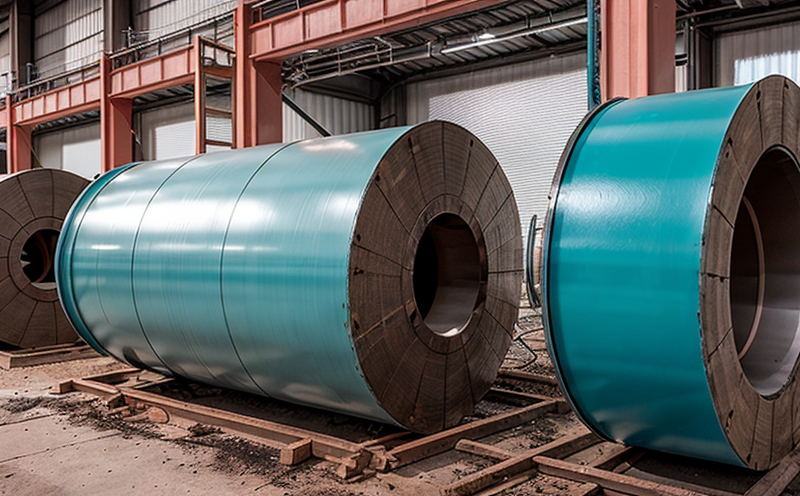EN 10130 Cold Rolled Steel Corrosion Resistance Testing
The EN 10130 standard is a crucial specification for cold rolled steel products, providing guidelines for the mechanical testing of corrosion resistance. This service focuses on evaluating the ability of cold rolled steels to resist corrosive environments, ensuring that they meet quality and safety standards in industrial manufacturing.
Corrosion resistance is essential in industries where materials are exposed to harsh environmental conditions such as saltwater, industrial chemicals, or fluctuating temperatures. The EN 10130 test helps manufacturers verify the durability of their products, thereby enhancing reliability and reducing maintenance costs. This testing ensures that cold rolled steel maintains its structural integrity over time.
The process involves subjecting a sample to controlled corrosive conditions, typically involving exposure to salt spray or immersion in an acid solution. The standard specifies detailed procedures for sample preparation, test setup, and evaluation criteria to ensure accurate measurement of corrosion resistance. Compliance with EN 10130 is critical for industries that need to meet stringent quality control requirements.
For R&D engineers and quality managers, this service offers a robust framework for developing and validating new products. By adhering to the EN 10130 standard, manufacturers can ensure their cold rolled steel meets international standards, thus enhancing product reliability and customer satisfaction. Compliance also helps in navigating regulatory requirements, reducing the risk of non-compliance penalties.
The testing process is rigorous and includes multiple steps. Samples are prepared according to specific guidelines provided by EN 10130. These samples are then subjected to controlled corrosive environments for a predetermined period. After exposure, the samples undergo detailed analysis to assess corrosion depth, surface changes, and structural integrity.
The acceptance criteria outlined in EN 10130 provide clear benchmarks for what constitutes acceptable performance under specified conditions. This ensures that only products meeting these stringent standards are released into the market. For procurement teams, this service offers a reliable method of selecting suppliers who adhere to high-quality standards.
In summary, the EN 10130 cold rolled steel corrosion resistance testing is vital for ensuring product integrity and reliability in industrial applications. By adhering to this standard, manufacturers can enhance their reputation, meet regulatory requirements, and build trust with customers.
Applied Standards
The EN 10130 standard is widely recognized in the industry for its comprehensive approach to evaluating cold rolled steel corrosion resistance. This standard provides detailed procedures and criteria for mechanical testing, ensuring that products meet stringent quality requirements.
- EN 10130-4: Specification of cold rolled steels with a thickness not exceeding 6 mm; this part specifies the mechanical properties and chemical composition.
- EN 10130-5: Additional specifications for cold rolled steels to ensure high-quality performance in various industrial applications.
The standard is continuously updated to reflect advances in metallurgy and testing techniques. This ensures that manufacturers can rely on the latest methodologies and standards, enhancing product quality.
Compliance with these standards not only guarantees product reliability but also helps in meeting international regulatory requirements. This is particularly important for companies operating across multiple countries or regions where different standards may apply.
Industry Applications
The EN 10130 cold rolled steel corrosion resistance testing has broad applications in various sectors of industrial manufacturing and processing. This service is particularly beneficial for industries where materials are exposed to harsh environments, such as the maritime, automotive, and aerospace sectors.
In the maritime industry, cold rolled steels must withstand prolonged exposure to saltwater, which can significantly accelerate corrosion. The EN 10130 test ensures that these materials maintain their structural integrity over time, reducing the risk of failure in critical components like hulls or piping systems.
The automotive sector benefits from this testing by ensuring that cold rolled steel parts are durable and reliable under various operating conditions. This is crucial for preventing premature failures in vehicle components such as exhaust systems, body panels, and suspension parts.
In the aerospace industry, where materials must endure extreme environmental stress, EN 10130 provides a standardized method to assess corrosion resistance. This ensures that critical components like structural elements or fasteners meet the stringent quality requirements necessary for safe operations.
The construction sector also relies on this testing to ensure that cold rolled steel used in infrastructure projects is capable of resisting corrosive conditions, such as those found in coastal areas or industrial settings. By adhering to EN 10130 standards, builders can enhance the longevity and reliability of structures like bridges, buildings, and pipelines.
For quality managers and compliance officers, this service offers a reliable method for ensuring that cold rolled steel products meet international standards. This enhances product reliability and customer satisfaction while reducing the risk of non-compliance penalties.
Use Cases and Application Examples
- Maritime Industry: Testing cold rolled steel used in ship hulls to ensure durability under saltwater exposure.
- Aerospace Industry: Evaluating structural elements for corrosion resistance in aircraft components.
- Automotive Sector: Assessing exhaust systems and body panels for long-term reliability.
- Construction Sector: Ensuring cold rolled steel used in coastal infrastructure projects can withstand corrosive conditions.
- R&D Engineers: Validating new products to ensure they meet EN 10130 standards before market release.
- Procurement Teams: Selecting suppliers who adhere to high-quality standards for cold rolled steel.
- Quality Managers: Ensuring compliance with international standards to enhance product reliability and customer satisfaction.
The EN 10130 standard plays a pivotal role in these industries by providing a standardized method for assessing corrosion resistance. This ensures that products meet stringent quality requirements, enhancing their durability and performance under various operating conditions.





